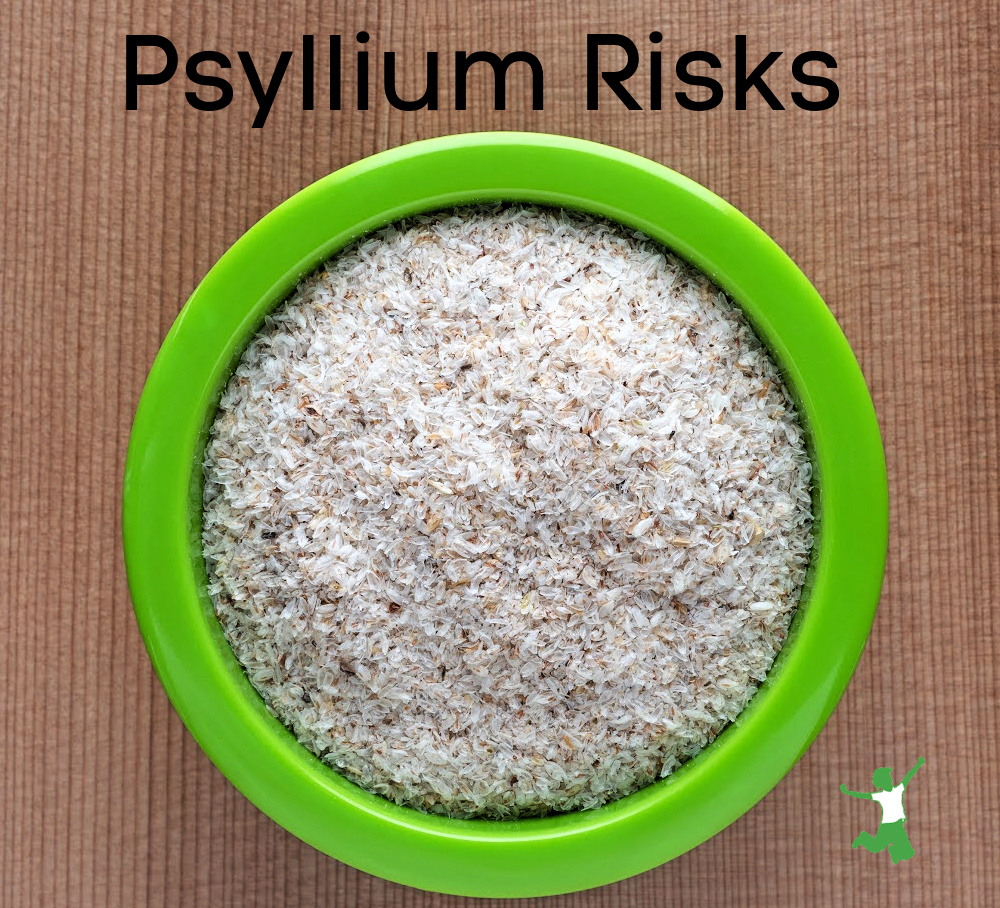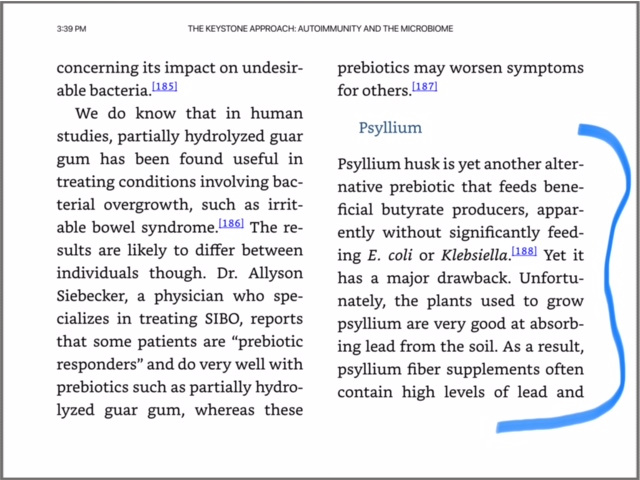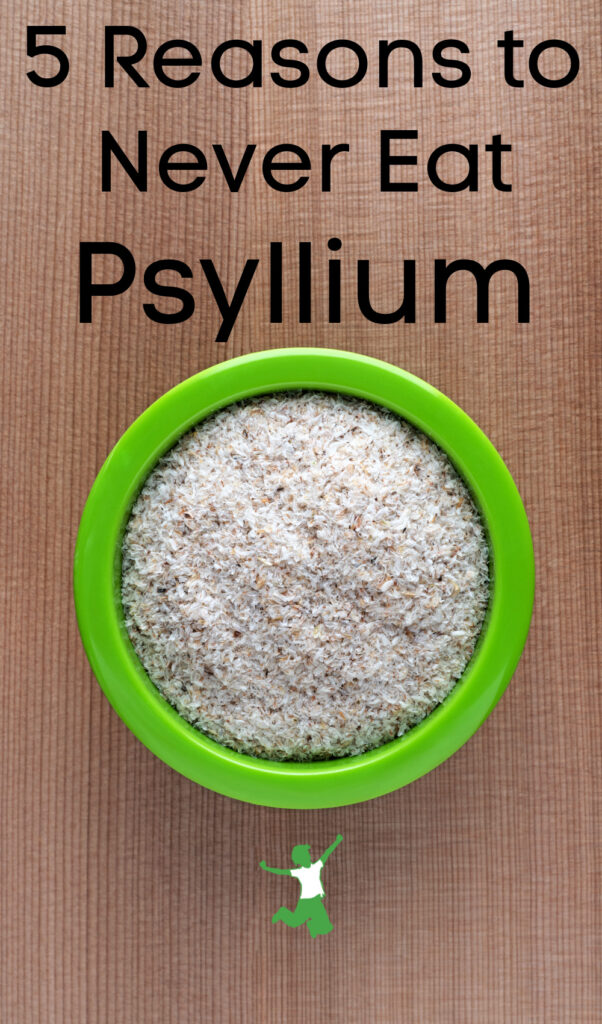The many reasons why regularly consuming psyllium fiber either as flakes or ground seed husks is not a healthy practice for the long-term and even risks heavy metal toxicity.

Psyllium is a substance contained in the seeds of some plants. Frequently touted as a natural and healthy food, the consumption of psyllium-containing seed husks is promoted as a natural solution for resolving several common chronic conditions.
However, there are a number of downsides to using psyllium. Conventional health authorities tend to completely ignore these dangers to the detriment of those seeking helpful advice on the subject.
What is Psyllium?
The plants that produce the seeds that contain psyllium include about 200 species within the plantain family. They thrive in a dry, cool climate and are primarily cultivated in northern India.
Organic psyllium is available at the health food store and freshly ground in a mortar and pestle at home before use. The husks also come already flaked or powdered for more convenient use.
Psyllium is the soluble fiber found in the husks of these seeds. The husks are loaded with cellulose and lignin that becomes gelatinous and sticky in water.
The gel-like texture of psyllium similar to flax or chia seeds when wet is why manufacturers sometimes use it as a food thickener primarily in ice cream and frozen desserts.
Politically correct nutrition recommends psyllium as a remedy for a number of common ailments today as outlined below.
Be sure to read to the end before deciding to use psyllium yourself, however, as there are many dangers in doing so!
Constipation
Psyllium is the active ingredient in Metamucil, a highly popular, over-the-counter quick fix for constipation.
Infrequent bowel movements are not only painful and uncomfortable. Failing to empty the large intestine at least once or (better) twice a day also slowly poisons and ages the body.
Estimates are that 15-20% of Americans suffer from chronic, almost constant constipation, with millions more suffering from the effects of toxin overload intermittently.
Given that the modern diet is composed primarily of processed foods with gut flora disrupting pharmaceuticals to mitigate its negative effects, it is no wonder that psyllium and products containing it are so popular.
But, just because it is natural, doesn’t mean it is actually healthy or beneficial!
Lowering Cholesterol
In 1998, the FDA approved heart health claims for psyllium on food labels based on research that suggested that seven grams or more per day of this soluble fiber would lower LDL and total cholesterol. (1)
The claims were based on a meta-analysis published in the European Journal of Clinical Nutrition. (2)
Of course, this research is based on the assumption that high cholesterol is dangerous and a primary cause of coronary artery disease, an assertion that is vigorously disputed by a rapidly growing number of experts in the field.
Type 2 Diabetes
In 2014, the FDA approved another health claim for psyllium as being of benefit for people with type 2 diabetes.
This occurred despite little scientific evidence in support of this claim. In fact, the European Food Safety Authority responsible for reviewing health claim proposals for the European Union, has no record of having considered a psyllium health claim for glucose management. (3)
Blood Pressure
Use of psyllium for a month or longer produces a small reduction in systolic blood pressure according to the Journal of Nutrition and Dietetics. (4)
However, is this small reduction worth the risks of psyllium in the diet? Probably not. Let’s see why.
Risks of Eating Psyllium
While conventional dietary authorities fall all over themselves to recommend psyllium, the risks to health from eating it regularly far outweigh any benefits.
Note that all three of the primary gut healing diets including the GAPS Protocol, Auto Immune Paleo, and the Specific Carbohydrate Diet recommend against psyllium. It is on the “do not eat” list.
That right there should give you a big clue as to the main problem with psyllium…it disrupts gut flora and the integrity of the intestinal wall in a major way.
Feeds Candida and Pathogenic Bacteria
The sticky, gelatinous fiber that psyllium becomes upon interacting with water is not digested or absorbed by the gastrointestinal tract.
Hence, it becomes food for all manner of pathogenic bacteria and yeasts like Candida albicans.
Specifically, it is the vegetable cellulose and lignin which some bacteria and fungi thrive on. While the digestive tract can handle small amounts of these substances, in concentrated form such as seed husks, they are highly detrimental to intestinal health.
What’s more, psyllium causes gastrointestinal inflammation. This triggers a negative immunological reaction that causes astronomical autoimmune (titers) antibodies. (5)
Husks Loaded with Phytates
Another big problem with psyllium is that the ground or flaked seed husks contain large amounts of phytates. These substances bind with calcium, iron, and zinc, causing malabsorption and potential mineral deficiencies.
Phytic acid can also cause gastrointestinal distress in the form of flatulence, distension, pain, bloating, and overall discomfort for some people. Over time, permanent damage to the colon can occur from repeated assault.
A solution to this problem would be germinating psyllium-containing seeds before de-hulling them. Sprouting deactivates most of the phytic acid in seeds. However, I’ve not seen sprouted psyllium husks available anywhere as of this writing.
Lead Contamination
Most people do not realize that eating psyllium is a significant risk factor for lead exposure.
The book The Keystone Approach indicates the plant that produces psyllium has an affinity for lead in the soil much like tea absorbs fluoride and rice absorbs arsenic.
Thus, sourcing is critical, yet most suppliers do not provide this important information to consumers.

Allergic Reactions
The sky-high autoimmune antibodies produced by consuming psyllium can translate into allergic reactions. These include rashes, itching, and shortness of breath among others. This can occur out of the blue after repeated exposures. Even just touching the psyllium husks can cause a reaction.
Psyllium has the potential to cause anaphylactic reactions as well, especially in healthcare workers who experience frequent exposure. (6)
Harm to Excretory Function
Because psyllium (bulking fiber to the max!) can absorb up to 16 times its dry volume in water, kidney function can also be affected.
This occurs if too many autoimmune antibodies are produced which can cause negative effects to the kidney (glomerulus) filtering unit. (7)
Note that some alternative sweeteners like xylitol also draw water into the bowels and can have a similarly negative effect.
Avoiding Psyllium Seed in ALL Forms is Best
In conclusion, while psyllium can have some benefits to health, the positives are short-term. The negative impacts over the long haul far outweigh them!
Most people, for example, use psyllium to help with constipation issues, but there are other natural methods to resolve infrequent bowel movements that strengthen the gut environment rather than harm it.
In short, while conventional health advice sings the praises of psyllium in the diet, smart consumers look at the whole picture and realize that avoiding it is the best policy.

References
(1) FDA – Code of Federal Regulations Title 21
(2) Time- and dose-dependent effect of psyllium on serum lipids
(3) Psyllium for Diabetes Management
(4) The effect of viscous soluble fiber on blood pressure: A systematic review and meta-analysis of randomized controlled trials
(5-7) Why Psyllium is Not Healthy
(8) The Keystone Approach








Hi Sarah , I know you say it’s not digested like other foods would be but doesn’t it bulk up and exit the body via bowel moment ??
Yes, psyllium does work to relieve constipation by bulking up the bowel movements, but the cost of this approach is further unbalancing the gut microbiome. It is not a “cure” for constipation … it is a band-aid that makes the situation worse over the long term.
Thank you Sarah for taking the time to reply. Im doing a little investigating with my health to figure out what is causing /contributing to my fairly recent strange symptoms and am taking into account all things I can consuming (psyllium being one of them ).
Sarah is there a lab test or home test kit you would recommend for testing oneself for candida?
Here’s a test you can do yourself for candida. https://www.thehealthyhomeeconomist.com/candida-saliva-test/
Hi Sarah , I’m not sure if I just failed to click Post comment but here it is again in the event I did forget :
Would it be too much of a stretch if someone told you that they were diagnosed with a fistula of the colon, female reproductive organ (V) and possibly the urinary tract caused by a long period of consuming large amounts of loose psyllium husk ?
I would appreciate your thoughts on this hypothetical scenario if you would be so willing . Thank you in advance !
The purple chatbox would be the appropriate place for these types of questions. Best regards, Jenn (comment moderator)
Thank you Sarah for the recommendation on the sourdough! Helps a lot. I have in the past bought a local organic GF sourdough at the farmers and the baker uses psyllium husk is why ask as well and her bread digests very well for me but ever since I read this article I did not use anymore . I am sure you much rather prefer xanthan gum when it comes down to it. That is what I have used based on your recommendation.
A lot of gluten free sourdough breads contain psyllium as a binder.Would you say it better not to have a bread with this binder even if just in occasion?Thanks!
Personally, I would not eat it. But, if you must have it on occasion, that is probably fine if you have strong digestion. The problem is that if a person eats gluten-free, by definition they probably have digestion that is on the weaker side. Here is a gluten-free sourdough that has no psyllium. https://amzn.to/3VqHraU
Somewhat off topic: Your comment on plantain as a lead accumulator sure drew my attention. I have cultivated plantain for herbal treatments, and we also add a very few of the young leaves to our salads. Would small amounts almost daily be a problem?
My father’s kidneys shut down after his doctor put him on Metamucil for constipation. He ended up in the hospital. Eventually passing away from kidney failure.
Sarah, what if I sourced the Psyllium from plantain plants in my paddocks (organic farming) and ate the dried seed heads in full rather than been processed?
Definitely a better choice, but this psyllium would still be loaded with phytates and disruptive to gut function (candida-encouraging).
Unfortunately, psyllium husk is the crutch most baked gluten-free breads need in the absence of gluten. I don’t want to use gums, so psyllium husk has been the binder for my gluten free sourdough and sandwich bread. :-/
Interesting…I had never heard anything negative about psyllium, thank you for enlightening me! I’ve been drinking it semi-regularly, for many years, to “keep moving,” particularly when traveling.
In my recent hospital stay, they gave me miralax, and when I asked about psyllium, they answered that it pulls water from your body. That was my first clue that it wasn’t all great…
Are there recommended alternatives to take for fiber supplementation? I’ve taken psyllium for years (a heaping tablespoon a day), as it seems to work best for me. Senna, inulin, and konjac root sometimes caused digestive issues. Would chia be a possibility, or black seed (Nigella sativa)? My family has a history of colon cancer.
Thank you for all of your informative and helpful articles and research!
The idea is to get your gut balanced to the point where you don’t need the band-aid approach of fiber to eliminate. Here are safer ways to stay regular than constantly damaging the colon with fiber. A chiropractic adjustment can really help things too.
https://www.thehealthyhomeeconomist.com/five-strategies-to-combat-constipation/
Sarah,
Fiber doesn’t ‘damage’ the colon. It’s food FOR the health of the colon.
Fiber most definitely damages the colon in the amounts recommended by the “experts”. I suggest reading this book and how too much fiber actually is a CAUSE of colon cancer. https://amzn.to/2xaeeDc
Lots of fiber is simply a band-aid to keep a person regular who has gut imbalance and terrible diversity of gut flora. Traditional societies did not eat fiber in the quantities recommended today.
The addition of GSE—grapefruit seed extract— to psyllium has helped me greatly. Having had candida and immune issues in the past, and finding that the anti fungal drugs only worked a short time, this combo was a great help. GSE is antibacterial, anti fungal, antiviral, anti-inflammatory. Do not take it at the same time as probiotics, as it is said to kill some of the good bacteria. Two hours apart is probably good. I assume that GSE could be effective against some of the intestinal germs mentioned above.
Another reason to take GSE with fiber is because it is said to help scrub the intestines aiding in absorption. My part of the US is full of allergens. Mucus and sinus drainage abound. I am now convinced that I haven’t absorbed a lot of meds well, because they couldn’t get through the GI mucus.
For the many diabetics and older people that are not passing the psyllium or other foods well—-they may have a problem with the nerves in stomach and intestine. It is called gastro-paresis. Areas of the GI tract can lose their nerve stimulation and food may sit there, barely moving, or not moving. The danger is malnutrition and a blockage in the intestine.
Here is the easiest way that I found to use GSE and psyllium: Use paper cup and plastic spoon, as psyllium sticks to utensils and regular cups. Put amount of water you want to use, say 6 oz. of water, in paper cup. Add GSE drops -I have worked up to about 10-15 drops. Obviously start slow, if you do not know if you are allergic to any substance. Then add amount of psyllium that you want to use… say, a teaspoon. Mix quickly and swallow, as it sets up fast and could form a blockage in throat.
Do not let GSE –a strong natural acid, remove enamel from your teeth by putting it in your mouth and leaving it there for awhile. If you have an oral condition that you are trying to treat with GSE and water, rinse the GSE mixture off your teeth after swishing.
Interesting. For me psyllium has been instrumental and very effective in making my bowels less frequent. During pregnancy, I stopped probiotics and I ended up having loose stools for months (many times a day, sometimes every hour). It became worse during the postpartum period. Now I take it on and off, but generally I suffer from the opposite of constipation. A few years ago I did a 1 month candida cleanse diet and it has been very effective. I have not have any issues with candida ever since, despite taking psyllium for long periods of time. I do believe that Psyllium could interfere with the absorption of some nutrients, but so does a constant state of loose stools. I kept GAPS diet for a while and it has helped, but not completely healed my GUT. I tried many food regimens and nothing has healed my GUT completely. During my worst times, usually psyllium is my answer. I wish I could find a good alternative, but I have not found one yet.